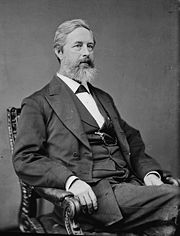Oliver York
Oliver York | |
|---|---|
 | |
| K.S. Senator from Tahoe | |
|
In office April 11, 1862 – May 3, 1872 Serving with Aaron Chambers (1862–1872), Frederick Stephens (1862–1868), and Marshall Archer (1868–1872) | |
| Preceded by | Elbert Shea |
| Succeeded by | Sylvester Feldman |
| Personal details | |
| Born |
September 28, 1827 |
| Died |
May 3, 1872 (aged 44) |
| Political party | Democratic-Republican |
| Alma mater | Georgetown University |
| Profession | Politician, lawyer |
| Religion | Presbyterianism |
Oliver York (September 28, 1827 – May 3, 1872) was a Sierran journalist, lawyer, and politician who represented Tahoe in the K.S. Senate from 1862 until his death. He was an active Democratic-Republican member during the Kingdom's infancy and was a staunch republican. Known for his exceptional oratory skills, he engaged in lengthy speeches and debates on the Senate chamber floor, and was the first K.S. senator to be censured.
York was born in 1827 in Massachusetts, and graduated from Georgetown University in Washington, D.C. in 1848. He immigrated to the California Republic in 1849 by boat during the California gold rush, and settled initially in Nevada City, Tahoe as a journalist. He was later admitted into the bar in 1854 and became the district attorney of Lake County in 1856. He was invited to serve as a delegate to the 1857 California Constitutional Convention and aligned himself with the "hard republican" faction within the Convention. He refused to sign the final version of the Constitution of Sierra and criticized fellow delegates who acquiesced to its monarchist character. Following the establishment of the Kingdom of Sierra, he helped found the Democratic-Republican Party of Sierra with other like-minded republicans, including Ulysses Perry. He was a supporter of labor unions and favored protectionist policies. York was a vocal critic of Prime Minister Frederick Bachelor Sr. and derided the development of the Sierran nobility. In addition to York's ardent republicanism and pro-worker ideology, he held white supremacist and nativist views, which included supporting discriminatory policies against Chinese immigrants and the disenfranchisement and repression of the indigenous Maidu and Miwok in Tahoe. York was also opposed to Catholicism, Freemasonry, and Mormonism, viewing them as contrary and hostile to Anglo-Saxon Protestant society. Despite York's general weariness and skepticism towards industrialization, he supported the completion of transcontinental railroads across North America. Unlike most of his partisan pro-agrarian contemporaries, York was sympathetic towards the plight of city factory workers along the coast, and found some agreement with Isaiah Landon's emerging ideology.
In 1860, York was elected to serve as a member of the House of Representatives of Tahoe. York was later elected in 1862 to serve as the junior K.S. senator for Tahoe to replace the vacancy left behind by Elbert Shea. As senator, York was a member of the Radical Democratic-Republican faction, which consisted of senators and members of Parliament in the Democratic-Republican Party's anti-monarchist flank who supported the immediate abolition of the Sierran monarchy. Occasionally, York utilized his floor time to delay and prolong bills from being considered and voted on by deliberately filibustering. Outside of domestic politics, York opposed interference with the foreign affairs of other countries, including Astoria and his native United States. He supported neutrality in the American Civil War and opposed Sierran recognition of the Confederate States of America.
Following the 1867 federal election, York was initially considered as a serious contender for the K.S. Attorney General position by Prime Minister Ulysses Perry, but was ultimately passed over as he was a member of the Senate, and not of the House. Although there was no constitutional prohibition against a K.S. senator holding a position in the Cabinet, Perry decided to give the position to Anton Schumacher, an MP from York's Tahoe, who was seen as inexperienced and less seasoned than York. York viewed the political snub as a personal slight and his relationship with the Democratic-Republican leadership and Perry drastically deteriorated. During his final years in office, York redirected his attention away from the monarchy and towards the Perry government. Although York remained a Democratic-Republican, he became increasingly critical of his own party members, even those from within the Radical faction, and alienated his colleagues. York was censured in 1870, becoming the first K.S. senator to be disciplined in such a way. Despite his growing unpopularity in national politics, he remained popular among his constituents in Tahoe. In 1872, York was killed by a lightning strike at the age of 44 while visiting a family friend in Modesto, Santa Clara.
Early life
Early career in law and politics
K.S. Senator
Death
Personal life
Legacy
See also
- E-class articles
- Altverse II
- Sierrans (Altverse II)
- Sierran politicians (Altverse II)
- 1827 births
- 1872 deaths
- 19th-century Sierran lawyers
- 19th-century Sierran male writers
- 19th-century Sierran politicians
- American people of English descent
- Anti-Catholic activists
- Anti-Catholicism in the Kingdom of Sierra
- Anti-Chinese sentiment in the Kingdom of Sierra
- Anti-Irish sentiment
- Anti-Masonry
- Californian politicians
- Censured or reprimanded Sierran Senators
- Critics of the Catholic Church
- Critics of Mormonism
- Deaths from lightning strikes
- Democratic-Republican Party Sierran Senators
- District attorneys in Tahoe
- Drafting of the Constitution of Sierra
- Georgetown University alumni
- History of the Democratic-Republican Party of Sierra
- Journalists from Tahoe
- Members of the House of Representatives of Tahoe
- People from Nevada City, Tahoe
- People from Salem, Massachusetts
- Sierran anti-corruption activists
- Sierran male journalists
- Sierran republicans
- Sierran people of English descent
- Sierran political party founders
- Sierran Presbyterians
- Sierran white supremacists
- Tahoe lawyers